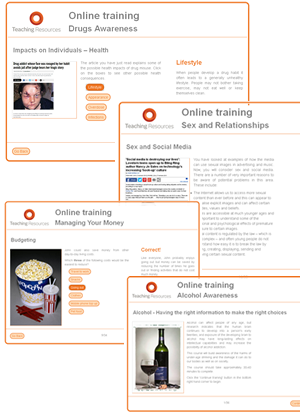 The brand new online training modules available from Teaching Resource Support offer teachers a more flexible approach to introducing students to the topics of SRE, finance, drugs and alcohol.
The brand new online training modules available from Teaching Resource Support offer teachers a more flexible approach to introducing students to the topics of SRE, finance, drugs and alcohol.
The online training modules have been developed by ASTs and PSHE experts and modified into online modules by experienced educational author, Steve Martin.
Each of the courses can be delivered via web link for individual completion or presented in the classroom as a group activity. The bespoke distribution tool allows you to track and monitor your training exercises.
There are currently 4 modules available to Premium Plus members which can be accessed via your TRS Dashboard:
Sex and Relationships
Young people are increasingly turning to the Internet and social media for sources of information about a huge range of topics. However, this can have damaging effects when it is used for information about SRE.
This SRE module helps to inform students about the potential for finding false and misleading information from these sources.
Managing Your Money
This training module is designed to help young people appreciate the concept of ‘money’. We explore the issues of paying for things – that everything has a price, and we need to accumulate enough money to obtain these items and budget accordingly.
Drugs Awareness
Having the right information to make the right choices.
In this KS4 training module, we think about illegal substance abuse and learn about the law in relation to drugs as well as sources of further advice both inside and outside school.
Alcohol Awareness
Alcohol can affect people of any age, but research indicates that the human brain continues to develop into a person's early twenties, and exposure of the developing brain to alcohol may have long-lasting effects on intellectual capabilities and may increase the possibility of alcohol addiction.
This course will build awareness of the harms of under-age drinking and the damage it can do to our bodies as well as on society.
These training modules are available to Premium Plus members - join now!

 Research suggests that nearly 70 % of children in the UK have had some kind of bullying experience – yet bullying is a sensitive and complex subject which can be difficult to talk about. One way to tackle it is through the inclusive and accessible medium of film. To tie in with Anti-Bullying Week 2014 (November 17-22) Into Film, an education charity supported by the BFI with Lottery funding, has developed a new resource featuring six carefully selected films – three for secondary - to promote discussion about bullying and related themes such as friendship, on-line safety, standing up for what is right and the power of groups, positive and negative. Films are free to order for all schools with an
Research suggests that nearly 70 % of children in the UK have had some kind of bullying experience – yet bullying is a sensitive and complex subject which can be difficult to talk about. One way to tackle it is through the inclusive and accessible medium of film. To tie in with Anti-Bullying Week 2014 (November 17-22) Into Film, an education charity supported by the BFI with Lottery funding, has developed a new resource featuring six carefully selected films – three for secondary - to promote discussion about bullying and related themes such as friendship, on-line safety, standing up for what is right and the power of groups, positive and negative. Films are free to order for all schools with an  Into Film is an education charity that puts film at the heart of young people’s learning. Into Film Clubs are FREE for all state funded schools and non-school settings and offer free access to thousands of films and education resources for learning through and about film, as well as opportunities to learn about filmmaking and go behind the scenes of the film industry. Inclusive and accessible for all students, film clubs help promote young people’s social, moral, spiritual and cultural development helping schools achieve OFSTED requirements.
Into Film is an education charity that puts film at the heart of young people’s learning. Into Film Clubs are FREE for all state funded schools and non-school settings and offer free access to thousands of films and education resources for learning through and about film, as well as opportunities to learn about filmmaking and go behind the scenes of the film industry. Inclusive and accessible for all students, film clubs help promote young people’s social, moral, spiritual and cultural development helping schools achieve OFSTED requirements.  I have two daughters. One receives her month’s pocket money and manages it carefully, so that by the time she receives the next month’s instalment she still has a little left. This has enabled her to build up a little savings that she tops up with birthday/Christmas/holiday gifts from her grandparents.
I have two daughters. One receives her month’s pocket money and manages it carefully, so that by the time she receives the next month’s instalment she still has a little left. This has enabled her to build up a little savings that she tops up with birthday/Christmas/holiday gifts from her grandparents. 